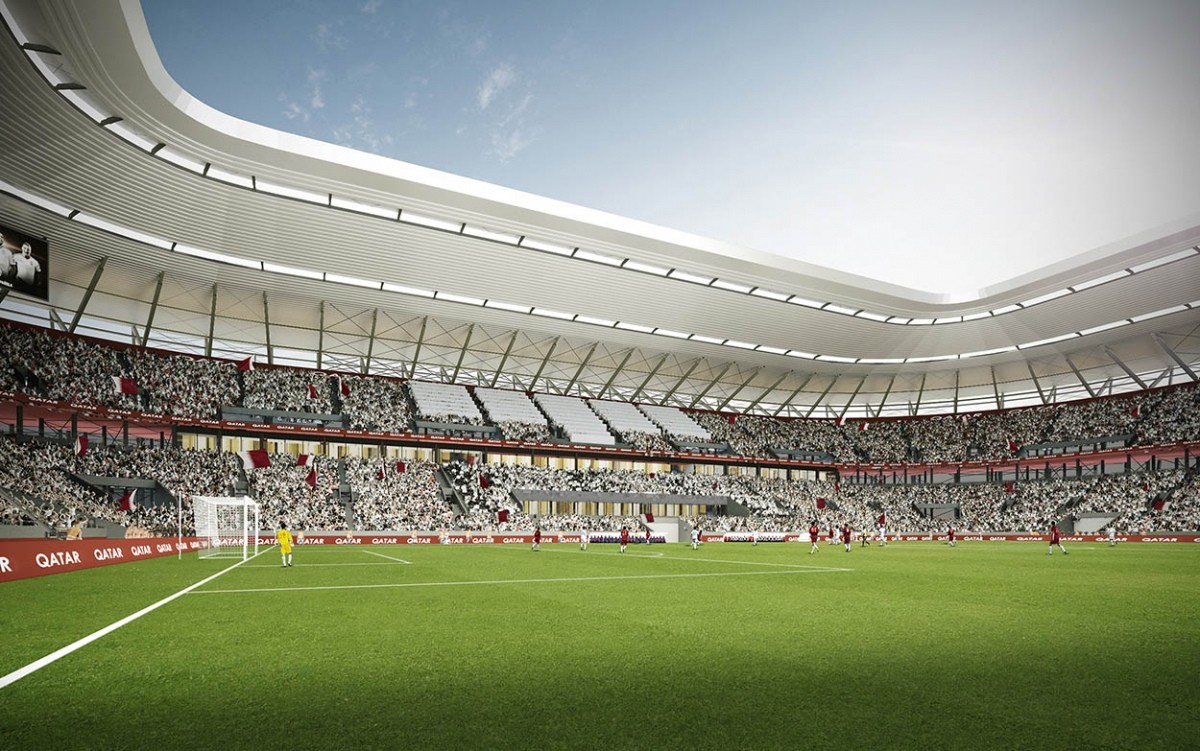.jpg)
_1-itok=GFMKQ6A9.jpg)
The Supreme Committee for Delivery & Legacy (SC) has unveiled the design of Ras Abu Aboud Stadium, the seventh 2022 FIFA World Cup™ stadium design to be released.
Due for completion in 2020, Ras Abu Aboud Stadium has a bold and innovative design concept, never seen in a FIFA World Cup™ venue before. Built using modular building blocks, it combines tournament experience and legacy planning in a revolutionary way to create a truly unique venue.
Commenting on the design, SC Secretary General H.E. Hassan Al Thawadi said: "Innovation has always been central to our plans for delivering a historic FIFA World Cup that leaves a legacy for Qatar and the world, and there is no better example of this than the design of Ras Abu Aboud Stadium.
"This venue offers the perfect legacy, capable of being reassembled in a new location in its entirety or built into numerous small sports and cultural venues. All of this in a stadium that delivers the atmosphere fans expect at a World Cup and which we will build in a more sustainable way than ever before. I'm delighted with this design and confident that Ras Abu Aboud will become a blueprint for future mega-event planners to follow."
Challenged with creating a venue that offers world-class atmosphere and fan experience as well as unrivalled legacy benefits, FI-A broke the stadium down into conceptual 'building blocks' and created a new design concept never seen at a mega-event before. The modular building blocks Ras Abu Aboud Stadium consists of are modified shipping containers, each containing fundamental stadium elements that can be quickly assembled and disassembled at various locations as required, all in pursuit of the SC's mission to ensure the 2022 FIFA World Cup™ Qatar leaves a lasting legacy for the country, the region and the world.
Discussing his firm's design for Ras Abu Aboud Stadium, FI-A Senior Partner and architect, Mark Fenwick, said: "We are delighted to be part of another 2022 FIFA World Cup™ project, and are very proud that our design for Ras Abu Aboud Stadium will go down in history as the first-ever moveable and reusable FIFA World Cup™ stadium. We are confident that this innovative and sustainable concept will be an inspiration for stadium developers and architects around the world, capable of creating aesthetically pleasing venues that offer new legacy possibilities."
Ras Abu Aboud's modular design also means construction of the venue will require fewer materials, create less waste and reduce the carbon footprint of the building process, all while reducing the time taken to build the stadium to as little as three years. Thanks to this sustainable approach to the stadium's construction, Ras Abu Aboud will receive a four-star Global Sustainability Assessment System (GSAS)certification.
Engineer Hilal Jeham Al Kuwari, Chairman of the Technical Delivery Office at the SC, said: "The launch of Ras Abu Aboud Stadium's design comes three months after the design launch of Al Thumama Stadium and six months after the inauguration of Khalifa International Stadium following its renovation.
"This succession of positive announcements highlights the continued progress being made on all World Cup projects, which have not been impacted by the illegal blockade on the State of Qatar. All of our projects are progressing per schedule and will be delivered by their target completion dates".
The 40,000-seat venue is slated for completion in 2020 and will be located in a 450,000m2 waterfront site on Doha's shore, where the use of shipping containers as one of the main building blocks will echo the nearby port. Situated just southeast of Doha and a mere 1.5km from the city's state-of-the-art Hamad International Airport, it will be serviced by excellent transport links, including a dedicated stop on Qatar Rail's Gold Line (less than a 10-minute ride from Doha's central Msheireb Station and just 25 minutes from the Airport), direct road connections to the centre of Doha and Al Wakrah, and potentially even a water taxi stop.
Engineer Yasir Al Jamal, Vice Chairman of the Technical Delivery Office at the SC, said: "We are thrilled to be launching the seventh 2022 FIFA World Cup stadium design. Ras Abu Aboud Stadium is a truly unique venue that is unlike any FIFA World Cup venue ever seen before, given it can be reassembled into other sporting and non-sporting venues across Qatar and the world".
The stadium precinct, meanwhile, will offer exceptional views over Doha's landmark Corniche and into the downtown West Bay area, making it an ideal location for a waterfront development after the tournament and ensuring a vibrant local legacy. Its design also reinforces Qatar's commitment to leaving a physical legacy proportionate to Qatar's needs after the tournament while heralding a new era of sustainable tournament infrastructure that can broaden the range of countries able to host such mega-events.
Federico Addiechi, Head of CSR at FIFA, added: "Qatar is delivering superb results in terms of sustainability and innovation, including the proposed design for Ras Abu Aboud Stadium. From day one, there has been a strong emphasis on sustainability from Qatar, including a commitment to ensure that all infrastructure meets strict design, build and operations criteria under the GSAS certification programme.
"GSAS is the most far reaching green building certification specifically for stadiums. In addition to design and build, certification is also available for operations. This has actually informed the 2026 FIFA World Cup bidding process. Bidders are now required to adhere to all three steps for newly built stadiums – just one example of the positive impact that Qatar is already having on future FIFA World Cups."
The launch of the design of Ras Abu Aboud Stadium follows the design launch of Al Thumama Stadium in August 2017 and the completion of Khalifa International Stadium for the Emir Cup Final 2017 in May. Ras Abu Aboud Stadium is one of eight proposed host venues for the 2022 FIFA World Cup™.

